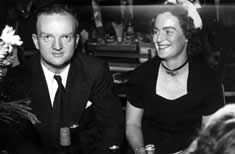Angus Maude, the next, was eased out and, you know, he sometimes spoke
candidly of the problem… towards the end of Angus’ short
term as Editor his magnificent old father who had been a senior man
on the London Times, a very dignified, handsome old man, tall
with white hair, I remember he said to me when I was introduced to him,
'And what is your particular trouble in the Sydney Morning Herald?'
There was a lot of talk, of which I have very little information, about
me becoming Editor. There was a suspense period between Pringle going
and Angus Maude coming, and, although I’m not privy to what was
said upstairs, there was, obviously. The man who pushed me all along was
Henderson. Who opposed me I cannot tell but I assume it was mainly Warwick
[Fairfax] but it could well have been Angus [McLachlan] too. I think it
probably was. I have no correct information one way or the other except
that Henderson told others as well as me that he wanted me to be the Editor.
But, though people find this hard to understand I had never envisaged
that. I could see enormous difficulties in that, not only from observation
of the people who had the chair but, as I’ve said earlier, to be
able to produce a paper like Nation was far more satisfying and
I gave a hint at one time to Mr Henderson that if he were thinking about
me as Editor, that if I were Editor I would have to, ultimately, after
a full consultation with everybody, have the editorials expressing my
point of view.
Now that I can see was not altogether a simple question. Whose views
does an editorial represent? There’s no answer and you could argue
that they are bloody nonsense. Because they’re written by a leader
writer. More often than not they’re his views. He’s a specialist
in the subject, nobody else bothers much to vet what he’s done.
But sometimes they’re the Editor’s views, very clearly, and
sometimes the Editor’s overruled and somebody else steps in, from
management. And there were terrible battles about editorials. Long drawn
out battles. Henderson went through agonies of differences with Warwick.
A senior executive called Lou Leck used to become very emotional about
these problems. Particularly around election time and around budget time.
[2]


